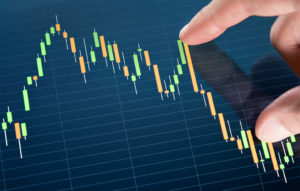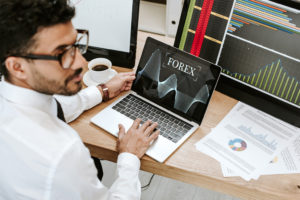What is Forex Trading? – Forex trading involves exchanging one currency for another.
Whether you are new to forex trading, tried it but didn’t get the results you had hoped for, or have chosen to abandon it for other investment opportunities, this post will help you get the information you need and answer most questions.
Whats Coming Up? - Table Of Contents
What Is Forex Trading?

Forex trading is another avenue to make money aside from stocks and bonds.
Forex trading is also known as the foreign exchange market, and it is the leading financial market globally.
It is estimated that more than $5 trillion is traded in the forex market every day.
The main goal of forex trading is to use a currency to profit from changes in its value.
Types Of Forex Pairs
Trying to make money from the forex market is tricky because many different currencies can be traded.
Therefore, the forex pairs are divided into four categories.
They are:
Major Pairs: These are the most traded pairs because they include the U.S. dollar, the Euro, and the British pound.
They are EUR/USD, GBP/USD, USD/JPY, and USD/CHF.
Minor Pairs: These pairs don’t include the U.S. dollar but still have a significant impact on the trading activity of this market.
These are EUR/GBP, GBP/JPY. EUR/CHF.
Exotic Pairs: These pairs include a primary currency and a minor one.
For example, USD/HKD, USD/PLN, GBP/MXN.
Regional Pairs: Regions like Australia and Scandinavia classify these pairs.
For example, AUD/NZD, EUR/NOK.
In most situations, forex transactions are initiated by individuals or banks by buying or selling one currency in the form of a forex pair and then eventually selling or buying another one.
However, predicting essential elements often forgotten in forex trading is making money by understanding the market and not predicting where it will go.
How Does Forex Trading Work?
Supply and demand are the major factors that influence price formation in a free, competitive marketplace.
Thus, a low supply and a high demand will result in a higher price, according to supply and demand.
Let’s assume you go grocery shopping one day, and you intend to buy crates of eggs.
There is only one merchant that has the precise number of crates of eggs you want.
You decide to approach the merchant; they give you the number of boxes you need, then you pay.
Both parties get what they wanted.
The next time you are out to shop for groceries, you still need eggs.
But this time, two more merchants have the exact number of egg crates you want to buy.
These three merchants compete for your business.
It means the demand for eggs is lower than the supply, and the merchants will have to compete to present the best deal to you – which could involve reducing the price to sweeten the deal.
The old price will be replaced with a newer, cheaper one because of the balance of supply and demand.
Alternatively, if you arrive at the market and more people are interested in buying crates of eggs, but there is only one merchant, the price could go up.
This is because the demand is high, but the supply is low.
The same concept applies to currency pricing.
When the demand for a currency is high relative to its supply, you can expect its value to increase.
In relation to our crate of egg analogy, if one of the egg merchants was to go bankrupt during a season, then before you and any other person interested in buying eggs show up in the market, the price of eggs will rise.

To understand how the Forex market works, one must visualize it as an ever-changing ocean.
As a result, small- and mid-sized companies are the most influential in influencing the trading market.
To trade on the Forex interbank, you must be a market participant.
This means that you need to have enough money in your account (over a certain threshold) and be allowed access to the interbank so that you can trade back and forth with each other.
The most prominent players in the Forex market are retail traders looking to trade on margin, which is necessary as their buying power is usually so small compared to the higher level traders.
Retail traders have to be wary of how they will fare in trading, especially as it’s not common for people to enter this market without a broker or a bank.
It is best if you learn how forex works to understand the risks involved in the industry.
Different Types Of Forex Markets
There are three main types of forex markets:
Spot Forex Market
The spot forex market is the most commonly traded market in which currencies are bought and sold for immediate delivery.
The settlement date of such trades is mainly on the spot.
Forward Forex Market
The forward forex market is a contract between two parties to exchange currencies at a specified date in the future.
Forward contracts are generally settled on a future date or “delivery date.”
The delivery date can be anywhere from one to twelve months after the contract is initiated.
Future Forex Market
The future forex market is a contract between two parties to exchange currencies on a specified date in the future.
The future contract is typically settled on a future date or “expiration date.”
What Is Leverage In Forex Trading?
Leverage in Forex trading is essentially using borrowed capital in conjunction with assets (money or shares) to speculate on the value of such assets.
Forex leverage is typically used with a margin account, which allows traders to borrow up to the value of their account without a margin call.
This means leverage can be used to amplify gains and minimize losses.
Some institutions have even gone as far as adding a percentage to their deposits (e.g., 10%) as additional leverage, which significantly amplifies gains while reducing losses.
With leverage, there is also some risk of losing money.
What Is Margin In Forex Trading?
Margin in Forex trading is the amount that a person deposits to his/her broker to trade, and it’s also called the margin requirement.
For an investor to buy or sell a currency pair, there must be enough margin on hand with the broker.
Thus, the broker maintains the risk to make sure that its clients can fulfill their obligations.

The broker’s job is to ensure that there’s enough capital with their clients.
In short, the more money that a person has deposited, the more positions they can open.
What Is A Pip In Forex Trading?
The ‘pip’ is a measure of the difference in the value of one currency against another.
In other words, it’s the value of one currency compared to another in terms of pips.
In forex trading, the pip is how the exchange rate between two currencies is determined.
Forex traders use pips to measure profits they make from buying one currency and selling another.
This trade is called “selling the spread.”
What Is Spread In Forex Trading?
Spread in forex trading is the difference between the price at which currency is bought and sold.
For example, if the EUR/USD rate is 1.3500 and you want to buy it at 1.3510, you will pay 0.0005 ($0).
If you intend to open a long position, you will sell the currency a little over the market price.
For a short position, you will sell a currency a little under the market price.
What Is A Lot In Forex Trading?
Lot is the unit of measurement for each trade in forex trading.
The standard lot size for most dealers is 100,000 units of a currency pair.
For example, if the EUR/USD currency pair is trading at 1.2500, the lot size will be 100,000 units of 1.2500.
This means that a trader can make 200,000 (200,000/100,000 =25) trades in this currency pair only at the most.
What Moves The Forex Market?
Supply and demand are the most critical factors driving the market for forex traders, meaning it is crucial to understand these influences.
They include:
Central Banks
Central banks are responsible for the value of a currency, so they closely watch currency values and exchange rates.
In addition, they have the power to buy or sell currencies in the open market.
This can influence currency prices if they decide that buying or selling is advantageous.
News Reports
A major news story can move currency prices up or down if a company reports earnings, the stock price increases, and the currency price drops.
Suppose a country announces that it is going to devalue its currency, the currency’s price decreases.
Market Sentiments
Economic data regarding foreign economies, such as gross domestic product (GDP), unemployment rates, and interest rates, affect currency prices.
Economic Fundamentals
Economic fundamentals drive changes in supply and demand for a particular currency.
For example, strong growth, inflationary pressure, and government spending can drive up a currency’s price.
Credit Ratings
Currency values are affected by your country’s credit rating based on the amount of debt your country owes.
With a high credit rating, you can borrow money more cheaply, and you have a better chance of getting investors for corporate bonds.
Key Takeaways
Forex trading is an alternative way to earn profits using currencies, stocks, and commodities.
It involves a lot of risks, but it also involves many profit opportunities.
Risk can be minimized by having a proper risk management system as well as by being able to utilize advanced techniques.
So, you need to take time to learn the forex trading market before you start your journey.
FAQs
What is forex trading?
Forex trading is exchanging one currency for another for trading purposes.
What are the main currency pairs?
The most common currency pairs are the USD/JPY, EUR/USD, GBP/USD, and USD/CHF.
What is leveraged trading?
When you leverage in forex, you gain more capital to trade with than you would have otherwise.
Leverage, in this sense, means your currency is borrowed from your broker and used as collateral to buy other currencies.
If the trade goes well, you earn money on the interest earned on those currencies.
How do you make money with forex?
You can see a trend and buy-in before the price goes up, or you can try to predict the trend by looking at charts and technical analysis.
What is institutional forex trading?
This is usually done by large investment banks, as they have the capital to leverage their position and are in a position to take advantage of trends.
